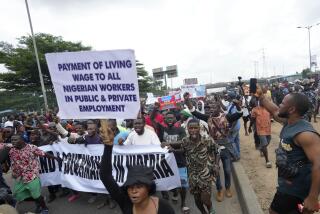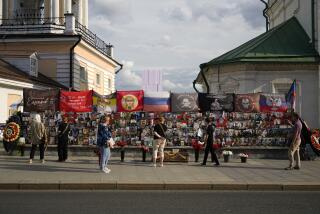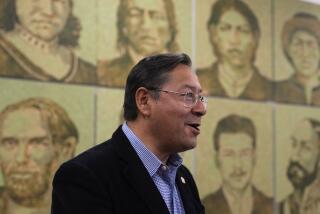Mali coup decried by Western and African leaders
A military coup in Mali, a country seen as a model of democracy for 20 years, drew quick condemnation from Western and African leaders Thursday, with calls for an immediate return to civilian rule.
The trigger for the coup, which resulted in soldiers looting the presidential palace in the capital, Bamako, appeared to be anger among members of the military who accuse the government of failing to arm its forces adequately enough to put down a January uprising by Tuareg rebels in the north.
A group of soldiers seized power early Thursday after a mutiny in a military camp near the capital. Leaders of the group, dubbed the National Committee for the Restoration of Democracy and State, appeared on state television and declared that the constitution had been suspended, the borders closed and all institutions of power dissolved.
“The objective of the [group] does not in any way aim to confiscate power, and we solemnly swear to return power to a democratically elected president as soon as national unity and territorial integrity are established,” the group reportedly said in a statement.
Amadou Konare, a spokesman for the coup leaders, said the government was ousted to end President Amadou Toumani Toure’s “incompetent” rule.
The whereabouts of the 63-year-old Toure, who has led the country for 10 years, was not immediately known.
Toure had been expected to step down after the presidential election scheduled for late April, but there was uncertainty about whether the vote would be postponed because of the northern crisis, which has seen the Tuareg rebels drive the military out of several towns. About 180,000 people have fled the desert region as fighting raged, some to other countries and many to other parts of Mali.
Several government ministers were reportedly held after the coup.
The takeover was condemned by the United States, European Union, African Union and the Economic Community of West African States, the regional body of African leaders.
“We call for calm and the restoration of the civilian government under constitutional rule without delay, so that elections can proceed as scheduled,”U.S. State Departmentspokeswoman Victoria Nuland said. “We stand with the legitimately elected government of President Amadou Toumani Toure. Mali is a leading democracy in West Africa and its institutions must be respected.”
African Union Commission Chairman Jean Ping called on the mutineers to end their coup.
Giles Yabi, West Africa analyst for the International Crisis Group, said the uprising came as no surprise given the depth of anger within the military over the issue of government provisions to fight the Tuareg rebels, as well as other complaints. What happens next depends at least in part on Toure’s fate, he said.
“If the president is in a military camp with some of the loyalists, the situation can still evolve,” Yabi said.
He said dissatisfaction was rife even before the Tuareg rebellion, with rumors of a possible military coup circulating last year.
“The frustration in the army was not only about the immediate reaction to the crisis in the north and the lack of military equipment,” he said. “There were complaints about corruption amongst senior officials in the military. There were some complaints about favoritism in the army and the way soldiers were chosen to go to fight in the north.”
Tuareg rebels have staged several insurgencies since the 1990s, accusing the government of marginalizing them. After two years of peace, the rebel group the National Movement for the Liberation of Azawad launched a new uprising in January, seeking an independent state it would call Azawad.
The government faced protests last month from families of soldiers who died fighting the rebellion.
Toure is a former military man who overthrew military ruler Moussa Traore in 1991, then restored democracy a year later and won office in elections in 2002 and 2007. He has repeatedly said he would stand down in next month’s vote, winning admiration in a region where many leaders have sought to overturn constitutional limits barring presidents from a third term in office.
Mali, a desert country with chronic food instability, is heavily dependent on international aid. It is in the grip of a food crisis, worsened by the displacement caused by the fighting in the north.
Even though the country is rich in resources such as gold and uranium and is a major cotton producer, much of its population lives in poverty.
Mali’s tourist industry has been shattered in recent years because of kidnappings and killings of Westerners by an Al Qaeda affiliate, Al Qaeda in the Islamic Maghreb.
More to Read
Sign up for Essential California
The most important California stories and recommendations in your inbox every morning.
You may occasionally receive promotional content from the Los Angeles Times.










